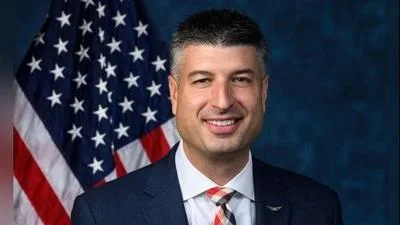Michigan Gov. Gretchen Whitmer
Michigan Gov. Gretchen Whitmer
A states’ rights organization is calling on Democratic Gov. Gretchen Whitmer of Michigan to ease COVID-19 restrictions on state residents who live outside Detroit and are fed up with the limitations on their freedoms.
“People are frustrated with the governor’s latest executive order,” said Jim Distelrath, Michigan state director of the Convention of States (COS) project, a non-profit group calling for a nationwide conference under Article V of the U.S. Constitution.
Executive Order No. 2020-42, signed April 9, 2020, temporarily suspends activities that are not necessary to sustain or protect life. Among other issues, the governor’s proclamation bans travel between two residences within the state: “Individuals may travel: (1) To return to a home or place of residence from outside this state. (2) To leave this state for a home or residence elsewhere. (3) Between two residences in this state, through April 10, 2020. After that date, travel between two residences is not permitted. (4) As required by law enforcement or a court order, including the transportation of children pursuant to a custody agreement. (c) All other travel is prohibited, including all travel to vacation rentals."
The drastic measures result from the rise COVID-19 cases in the state, according to language in the mandate.
“This virus is both aggressive and persistent: on April 8, 2020, Michigan reported 20,346 confirmed cases of COVID-19 and 959 deaths from it,” the governor states in the executive directive. “To win this fight, and to protect the health and safety of our state and each other, we must be just as aggressive and persistent. Though we have all made sacrifices, we must be steadfast.”
The number of reported COVID-19 cases has since increased. In only four days, 24,638 people tested positive for COVID-19 and 1,487 have died as of April 12 at 3 p.m., according to a news release.
“The order is too restrictive,” Distelrath told the Capitol Times. “You can’t travel between your own two residences within the state, you cannot operate a boat on the water with a motor. How is that spreading the virus?”
Distelrath is among the 50,000 people in Michigan who are COS members and who would prefer more regionally focused stay-at-home guidelines as opposed to draconian measures blanketed across the entire state.
“The governor is restricting things far more than they need to be,” he said in an interview. “There’s no reason the rest of the state needs to be shut down when the virus is concentrated in southeast Michigan.”
Overall, COS, with 1.5 million followers nationwide, is displeased with federal legislators who passed large stimulus bills to treat the economic fallout from the COVID-19 outbreak.
“There’s little concern for how it’s going to be paid back,” Distelrath said. “We’re printing money.”
As a result, COS has been working toward restoring the 10th Amendment, which maintains the balance of power between the federal and state government and the people of the United States.
“We want to bring power back to the people and reduce the size, scope, and jurisdiction of the federal government,” Distelrath said. “It’s been diluted through decisions of the U.S. Supreme Court.”
Michigan is among 19 states whose legislatures have yet to pass a COS resolution so that a convention of states, as outlined in Article V of the U.S. Constitution, can be gathered. Resolution SJRL was sponsored by Sen. Curt VanderWall (R-Ludington) but it is currently stuck in the government operations committee of the Senate.
“If it weren’t for the fact that they aren’t in session due to COVID-19, it would have been passed already presumably,” Distelrath said.
A total of 34 states must pass the resolution before action can be taken toward scheduling and hosting a convention of states.
States whose legislatures have passed the resolution include Alabama, Alaska, Arizona, Missouri, Texas, Utah, Arkansas, Georgia, Indiana, Louisiana, Mississippi, North Dakota, Oklahoma, Florida and Tennessee.
While supporters of Resolution SJRL wait for the legislature to meet again, COS is using the time to regroup.
“There’s not a lot we can do legislatively right now so we’ve shifted our focus to building the grassroots organization, recruiting more volunteers and educating people,” Distelrath said.





 Alerts Sign-up
Alerts Sign-up